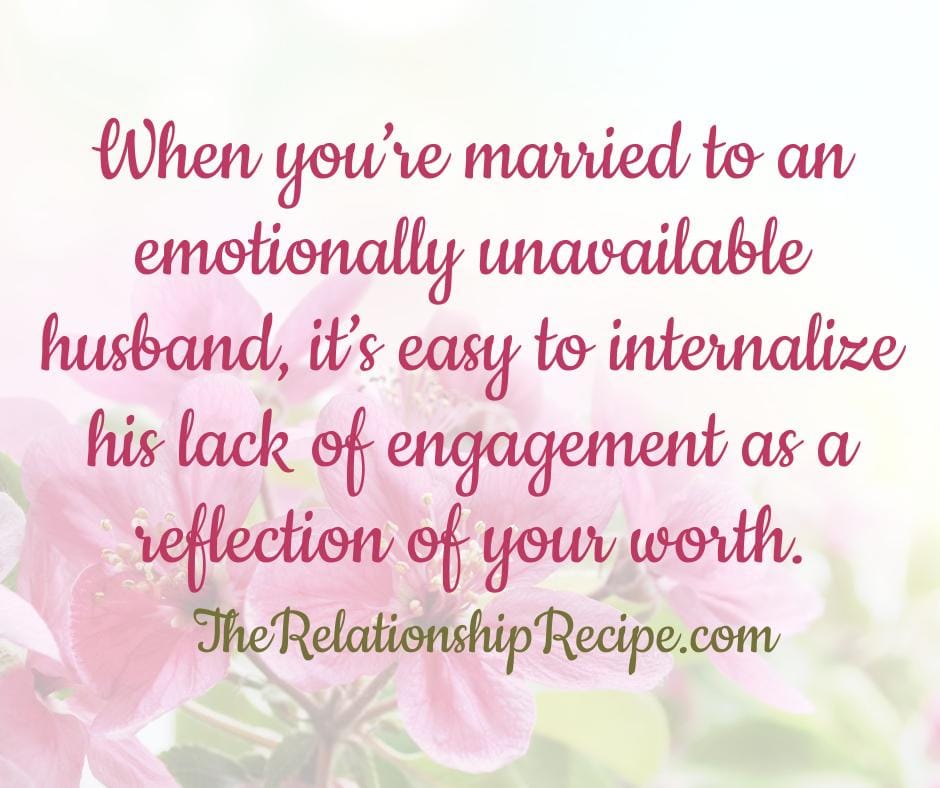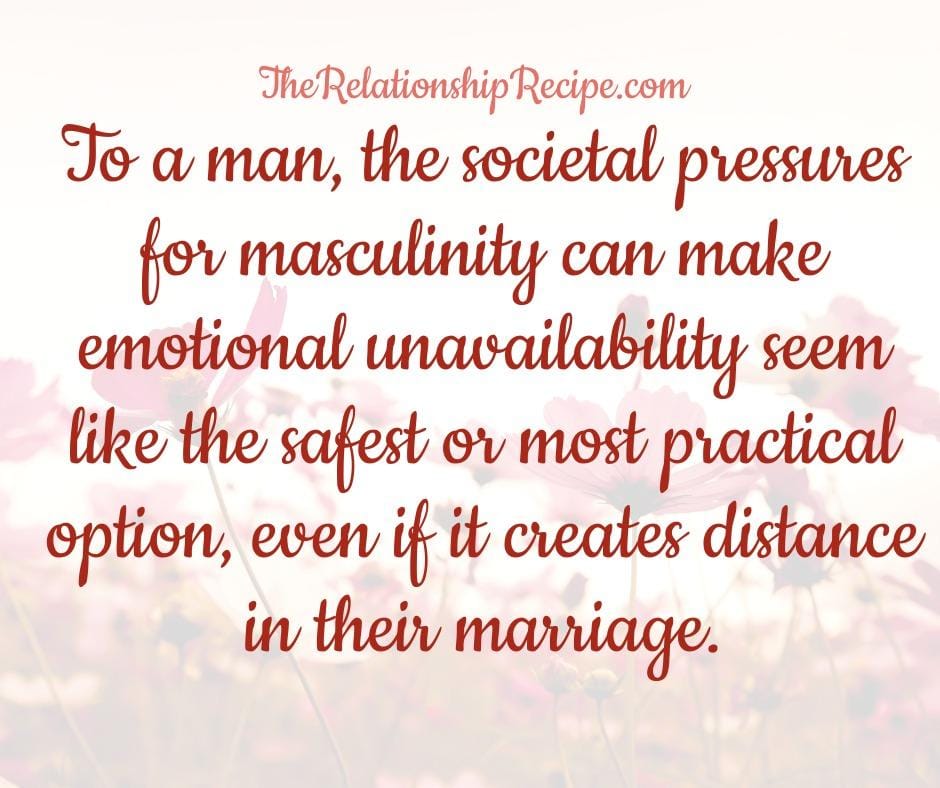It took me years to finally see that I married an emotionally unavailable husband. Years of feeling unseen and unheard. Unimportant. Dismissed.
Emotional unavailability in a husband doesn’t just happen by chance. It’s the result of deep-rooted patterns, past experiences, and sometimes even unaddressed trauma.
If you’ve ever wondered why your husband seems closed off, distant, or unable to meet you emotionally, you’re not alone.
Understanding what makes an emotionally unavailable husband act this way is the first step to figuring out whether change is possible or if you’re fighting a losing battle.

Key Highlights:
- 👉Recognizing Emotional Unavailability: Explore 50 distinct behaviors that reveal an emotionally unavailable husband, from subtle detachment to overt disregard for emotional connection.
- 👉Why Men Shut Down: Understand the psychological roots of emotional unavailability, including childhood experiences, societal pressures, and unresolved trauma.
- 👉The Challenges of Leaving: Discover what to expect when leaving an emotionally unavailable husband, from emotional quiet to personal rediscovery.
- 👉Navigating Life After: Learn how to break free from old patterns, rebuild emotional intimacy, and reclaim your sense of self.
- 👉Empowerment Through Insight: Gain the tools to recognize emotional detachment, decide your next steps, and thrive beyond the relationship.

Recently, I posted an article where I expressed surprise (and some relief) at the strange way he reacted when I told him I wanted a divorce. He was very nonchalant about it….as if he was reading the paper!
Totally indifferent.
I think his lack of reaction was based more on his emotional unavailability, and habitual stoicism. I doubt he was expecting it, as he isn’t very in tune with our relationship. As long as things are good for him, he seems fine to ignore my unhappiness.
His reaction really shouldn’t have been a surprise.
…..
My husband grew up with a controlling, unpredictable, moody mother and was basically a latchkey kid like a lot of us Gen X babies raised in the ‘70s and ‘80s. By the time he was a teenager, his parents were locked in a nasty breakup – loud fights, shattered dishes, the whole ugly mess. His parents split, and from that point on, he was pretty much left to raise himself.
It’s kind of wild that out of the three siblings, he was the only one who got married.
Looking back now, it’s no surprise that emotional closeness was never his strong suit. But at the time, I didn’t have the language to name it. I just knew something felt off. The man I married was emotionally distant, but I chalked it up to stress, trauma, or the classic “he just needs time.”
When I finally started thinking about divorce, my anxiety went through the roof. I was bracing for emotional fallout that never came. I expected him to fall apart or at least react, but he didn’t. I was projecting my own fears and insecurities onto someone who’d already built a life around emotional shutdown.
I used to think I could bring him “out of his shell”. That was wishful thinking wrapped in naiveté. I was too inexperienced when I married him to understand what emotional unavailability looked like, or how much damage it could do.
The one silver lining in surviving a long, rocky marriage with an emotionally unavailable husband is when it’s finally over, you might be battered and bruised, but you know exactly what you don’t want ever again.
✔️Note to self: Don’t waste time on a man who can’t connect emotionally.

Now, let’s unpack the psychology behind his emotional walls and why they’re so hard to break down, the 50 examples of an emotionally unavailable husband, and finally, what to expect should you decide to leave the relationship.

Why an Emotionally Unavailable Husband Might not be Obvious at First
At first, an emotionally unavailable husband may not seem distant or detached because his unavailability is often hidden beneath the surface.
Early in a relationship, he may present as loving, attentive, and even affectionate – at least enough to keep you engaged. The issue isn’t always obvious, because he might mask his emotional distance in different ways.
For instance, he may express his care through actions like providing financially, handling practical tasks, or even showing moments of affection.
These gestures can create an illusion of emotional connection, making you believe that he’s invested in the relationship. (This is most definitely my situation.)
Also, many emotionally unavailable husbands are skilled at hiding their detachment. They might avoid deep or meaningful conversations, deflect questions about their feelings, or withdraw when emotions run high. This makes it difficult to pinpoint the emotional void until it becomes a persistent issue over time.
You might also overlook these signs because emotional unavailability doesn’t always manifest as coldness or neglect. Sometimes it shows up as passive indifference, where he simply doesn’t engage enough to make you feel truly seen, heard, or understood. This gradual withdrawal can make it hard to notice until you’re deeply invested and begin to question why your emotional needs aren’t being met.

What Causes an Emotionally Unavailable Husband?
Understanding what makes an emotionally unavailable husband requires digging into the layers of his personal history, psychological makeup, and learned behaviors.
Emotional unavailability doesn’t appear out of nowhere—it’s a complex issue rooted in early experiences, societal expectations, and sometimes even trauma.
Let’s take a deep look into the psychology behind why some men struggle to connect emotionally in their marriages.
💡Childhood Experiences and Emotional Conditioning
For the emotionally unavailable husband, the roots of their detachment trace back to childhood. If a man grew up in an environment where emotions were dismissed, ridiculed, or punished, he likely learned to suppress his feelings as a survival mechanism.
- Emotional neglect: A boy who wasn’t comforted when he cried or wasn’t allowed to express sadness or fear might grow up believing emotions are a sign of weakness.
- Parentification: In homes where children were forced to take on adult responsibilities, they often suppressed their own emotional needs to care for others.
- Inconsistent parenting: Having caregivers who were unpredictable or emotionally absent can lead to a man guarding his emotions to avoid vulnerability and potential pain.
These early lessons create a blueprint that many men carry into adulthood, shaping how they approach relationships and emotional intimacy.
💡The Influence of Masculinity Norms
Society often plays a significant role in shaping an emotionally unavailable husband. Traditional ideas of masculinity—stoicism, self-reliance, and toughness—teach boys to suppress vulnerability and prioritize control over connection.
These cultural messages can manifest in adulthood as:
- Fear of vulnerability: Many men equate being vulnerable with being weak or exposed, leading them to avoid emotional intimacy altogether.
- Discomfort with emotional language: Without practice or encouragement to express emotions, they may struggle to articulate their feelings, leading to avoidance rather than engagement.
- Pressure to “fix” instead of feel: Men often internalize the belief that their role is to solve problems, not to sit with uncomfortable emotions.
To a man, the societal pressures for masculinity can make emotional unavailability seem like the safest or most practical option, even if it creates distance in their marriage.

💡Past Trauma and Emotional Scars
Unresolved trauma is another major factor that can make a husband emotionally unavailable. Whether it’s childhood abuse, a difficult breakup, or a betrayal, these experiences can leave emotional wounds that affect how he approaches relationships.
- Fear of rejection: Trauma often instills a deep fear of being hurt again, causing men to shut down emotionally as a form of self-protection.
- Attachment wounds: A man who experienced abandonment or neglect may develop avoidant attachment tendencies, keeping others at arm’s length to avoid reliving past pain.
- Unprocessed grief: Losses that haven’t been dealt with—whether the death of a loved one or the loss of a dream—can leave emotional baggage that prevents genuine connection.
If these issues are left unaddressed, they can create significant barriers to emotional availability.

💡A Lack of Emotional Role Models
Many emotionally unavailable husbands simply never had someone model healthy emotional expression. If his parents or caregivers didn’t demonstrate how to manage emotions, resolve conflicts, or express love openly, he might not know how to do these things himself.
This lack of guidance often leads to:
- Emotional suppression: Without knowing how to process emotions, he may repress them altogether.
- Avoidant tendencies: He may steer clear of emotionally charged situations because they feel overwhelming or unfamiliar.
- Misunderstanding intimacy: He might equate love with duty or actions (e.g., providing financially) rather than emotional closeness.

💡Personality Traits and Mental Health
Certain personality traits and mental health conditions can also contribute to emotional unavailability. For instance:
- Alexithymia: This condition, which involves difficulty identifying and expressing emotions, can make emotional connection seem almost impossible.
- Introversion: While not inherently a problem, extreme introversion can make a man seem distant or detached, especially if he struggles to communicate his needs.
- Depression or anxiety: Men dealing with these conditions often withdraw emotionally, either because they lack the energy to engage or because they fear being a burden.
These underlying factors often go unnoticed but can deeply influence his ability to be emotionally present.

💡The Fear of Losing Control
For some emotionally unavailable husbands, emotional detachment is about maintaining control. Being vulnerable means opening up to uncertainty, which can feel deeply uncomfortable. This need for control can stem from:
- Perfectionism: The belief that showing emotions equals imperfection.
- Fear of dependence: A reluctance to rely on others emotionally, rooted in a desire to appear self-sufficient.
- Distrust: If he’s been hurt or betrayed in the past, he may withhold his emotions to maintain power and avoid vulnerability.

How This Affects the Marriage
Understanding these root causes doesn’t excuse emotional unavailability, but it can help shed light on why your husband might struggle to connect. These deep-seated issues don’t disappear overnight, and unless he’s willing to confront them, the emotional gap in your relationship is likely to persist.
By addressing these factors—either through therapy, open communication, or self-awareness—a man can begin to unlearn the behaviors that keep him emotionally unavailable.
However, it’s important to remember that his willingness to change plays a critical role. Without that, the cycle of emotional distance may remain unbroken.

50 Examples of Emotionally Unavailable Husband
🚩Communication Issues
- Rarely initiates meaningful conversations about feelings or the relationship.
- Shuts down or becomes defensive when asked to express his emotions.
- Uses sarcasm or humor to deflect serious discussions.
- Avoids answering direct questions about his thoughts or feelings.
- Fails to listen actively during important conversations.
🚩Lack of Emotional Support
- Dismisses or minimizes his wife’s feelings as “overreacting.”
- Rarely offers comfort or validation during her tough times.
- Shows disinterest in her passions, struggles, or achievements.
- Avoids discussing future plans or dreams together.
- Criticizes her for being “too emotional” or needy.
🚩Physical and Affectionate Distance
- Rarely initiates physical affection, like hugs or holding hands.
- Shows little interest in intimate moments or sex.
- Pulls away when she seeks comfort through touch.
- Avoids eye contact during emotional conversations.
- Doesn’t make time for simple gestures, like kissing her goodbye.
🚩Prioritizing Everything Else
- Consistently prioritizes work or hobbies over spending time with her.
- Cancels plans frequently without showing remorse.
- Rarely participates in family activities or events.
- Invests more time and energy in friendships or social circles than in his marriage.
- Acts disinterested during shared experiences, like vacations or date nights.
🚩Emotional Withdrawal
- Avoids discussing or addressing conflict in the relationship.
- Goes silent or leaves the room during arguments.
- Refuses to compromise or acknowledge his part in problems.
- Fails to notice when she’s upset or struggling emotionally.
- Holds grudges instead of working through issues.
🚩Lack of Empathy
- Dismisses her struggles as insignificant compared to his own.
- Fails to ask how her day went or check in on her well-being.
- Doesn’t show concern when she’s physically or emotionally unwell.
- Ignores her boundaries or personal needs.
- Reacts with annoyance or frustration when she’s upset.
🚩Lack of Effort
- Fails to celebrate milestones like anniversaries or birthdays.
- Rarely initiates quality time together, like dates or activities.
- Puts minimal effort into resolving ongoing relationship issues.
- Shows no interest in couples counseling or self-improvement.
- Avoids meaningful gestures that show care, like small surprises or love notes.
🚩Neglecting His Role in the Relationship
- Doesn’t share the mental load of household or parenting responsibilities.
- Relies on her to handle all emotional labor in the marriage.
- Refuses to take responsibility for his mistakes or actions.
- Acts indifferent to the state of the marriage.
- Dismisses her efforts to improve their connection.
🚩Emotional Immaturity
- Struggles to regulate his own emotions, resorting to anger or detachment.
- Engages in passive-aggressive behavior rather than direct communication.
- Fails to apologize sincerely when he’s wrong.
- Focuses solely on his needs and wants.
- Doesn’t recognize the emotional toll his behavior takes on her.
🚩Stonewalling or Avoidance
- Changes the subject when emotions or feelings come up.
- Retreats into distractions, like his phone, TV, or games, to avoid interaction.
- Avoids being vulnerable or discussing his fears and insecurities.
- Spends most of his free time alone or apart from her.
- Responds with indifference or silence when she expresses her concerns.
These patterns often leave the wife feeling unseen, unheard, and unvalued, eroding emotional intimacy over time.

What to Expect When Leaving an Emotionally Unavailable Husband
Walking away from an emotionally unavailable husband is not just about closing a chapter—it’s reclaiming your emotional freedom and rediscovering yourself.
While you may feel a mix of relief and uncertainty, what lies ahead can be both challenging and empowering.
Let’s explore what you can truly expect when you leave.

The Immediate Shock of Emotional Quiet
If you’ve spent years trying to bridge the emotional gap, you might be surprised at how quiet life feels without the push-and-pull dynamic of trying to connect with someone unwilling to meet you halfway.
It’s like stepping off a treadmill—you’re no longer expending energy to get nowhere, but the stillness can feel unsettling at first. You might catch yourself second-guessing the decision or wondering if you could have tried harder, but don’t mistake the absence of effort for peace. This quiet is the space you need to start hearing yourself again.

A Rollercoaster of Unexpected Emotions
Many women expect relief and freedom after leaving an emotionally unavailable husband, and while those feelings do come, they often ride shotgun with guilt, anger, and even grief.
You’re not just mourning the loss of the relationship—you’re grieving the years spent hoping he’d change, the love you gave without receiving, and the version of the marriage you deserved but never had. Recognizing these emotions as valid is healthy and essential for moving forward.
At the same time, don’t be surprised if you experience moments of joy that feel almost forbidden.
The first time you laugh without worrying about being misunderstood, or make a decision without his indifference weighing you down, you’ll start to realize just how much space his emotional absence occupied in your life.

The Pull of Familiar Patterns
Even if the relationship was unfulfilling, it was familiar. After leaving, you may feel drawn to those familiar dynamics—not because you want him back, but because breaking free from old patterns is hard.
You might find yourself overexplaining decisions to friends or hesitating to assert your needs, habits you developed while walking on eggshells in your marriage. The key is to notice these tendencies and remind yourself that you’re no longer in that space.
This phase is also when the doubts creep in.
You might wonder if leaving was worth it, especially when loneliness hits. But remember, loneliness with potential for growth is far better than loneliness in a one-sided marriage. You may have even had thoughts of how liberating it would be to live alone.

A Shift in How You See Yourself
One of the most surprising shifts is how your self-perception changes.
When you’re married to an emotionally unavailable husband, it’s easy to internalize his lack of engagement as a reflection of your worth.
After leaving, you’ll slowly begin to separate his limitations from your value. It’s not instant—years of feeling unseen don’t disappear overnight—but every small step toward self-awareness feels like reclaiming a piece of yourself.
You may also notice how much lighter you feel.
Without the constant effort to draw emotion out of someone unwilling to give it, your energy can be redirected to yourself, your passions, and relationships that actually reciprocate.

The Challenge of Building Emotional Intimacy
Leaving an emotionally unavailable husband often exposes how much you’ve guarded your own heart over the years. While he may have been the one shutting you out, you likely built walls to protect yourself from the pain of rejection. Moving forward, you’ll need to unlearn those defenses to create meaningful connections.
The good news is you’ll be more discerning about where you invest your energy. You’ll recognize red flags sooner and won’t waste time on people who can’t meet you emotionally.
That’s the payoff for all the pain – you’re wiser, stronger, and ready for real intimacy.

The Sweet Taste of Freedom
Freedom after leaving an emotionally unavailable husband isn’t just about doing what you want; it’s no longer carrying the weight of a relationship that was emotionally draining you. You’ll start making decisions based solely on your needs and desires, without factoring in his detachment or disapproval.
It might feel strange at first – choosing a restaurant because you want to try it, decorating your space how you like, or even just being able to cry without judgment. These small freedoms will slowly remind you of what it feels like to live for yourself again.
Leaving an emotionally unavailable husband is a journey of rediscovery. It’s not always smooth, but it’s worth every bump along the way. You’re not just leaving a relationship, you’re reclaiming your life.
FAQ:
1. What are the signs of an emotionally unavailable husband?
An emotionally unavailable husband avoids deep conversations, deflects emotions, withdraws during conflicts, and struggles to express vulnerability or meet emotional needs.
2. Why is emotional unavailability hard to notice at first?
Many emotionally unavailable husbands mask their detachment with affectionate gestures or practical actions, making it seem like they’re emotionally engaged when they’re not.
3. Can an emotionally unavailable husband change?
Yes, but only if he’s willing to confront past trauma, societal conditioning, or emotional barriers and actively work toward building emotional intimacy.
4. What happens when you leave an emotionally unavailable husband?
Expect emotional relief, but also challenges like rebuilding self-worth, facing lingering doubts, and navigating life after emotional neglect.
5. How does emotional unavailability develop in husbands?
It often stems from childhood neglect, trauma, societal norms, or attachment issues that discourage vulnerability and emotional expression.
6. Is emotional unavailability a permanent trait?
No, with self-awareness and therapy, emotional unavailability can be addressed, but lasting change requires genuine effort and personal growth.
7. How can I cope with an emotionally unavailable husband?
Set clear boundaries, focus on self-care, seek support, and consider therapy to navigate the emotional disconnection in the relationship.
8. Why do emotionally unavailable husbands avoid vulnerability?
They may fear rejection, associate emotions with weakness, or lack emotional tools due to upbringing or societal pressures.
9. How can I spot emotional unavailability early in a relationship?
Watch for avoidance of emotional topics, lack of vulnerability, and discomfort with deep conversations or emotional closeness.

This post may contain affiliate links. I earn from qualifying Amazon purchases at no extra cost to you.





